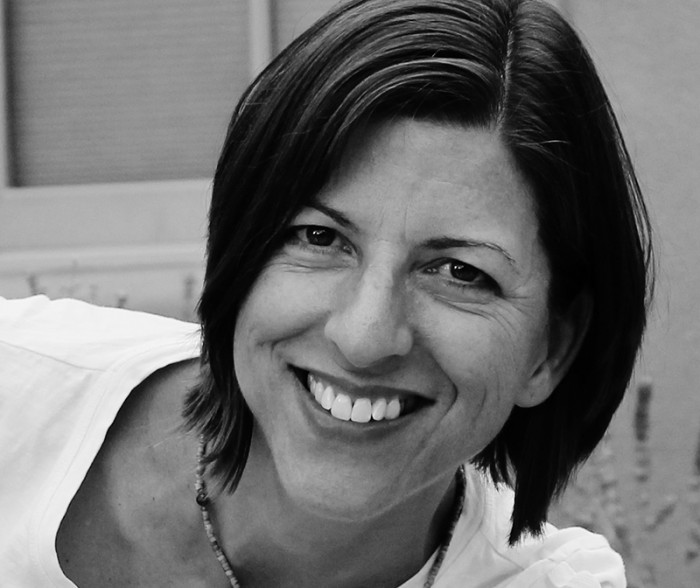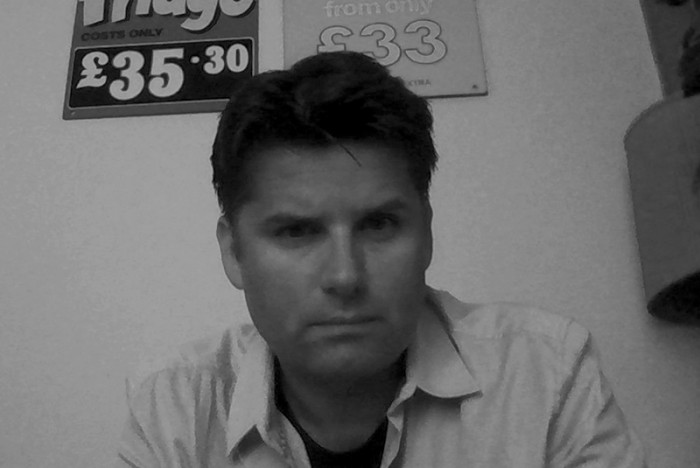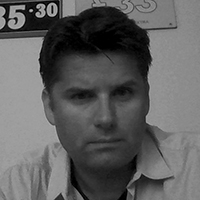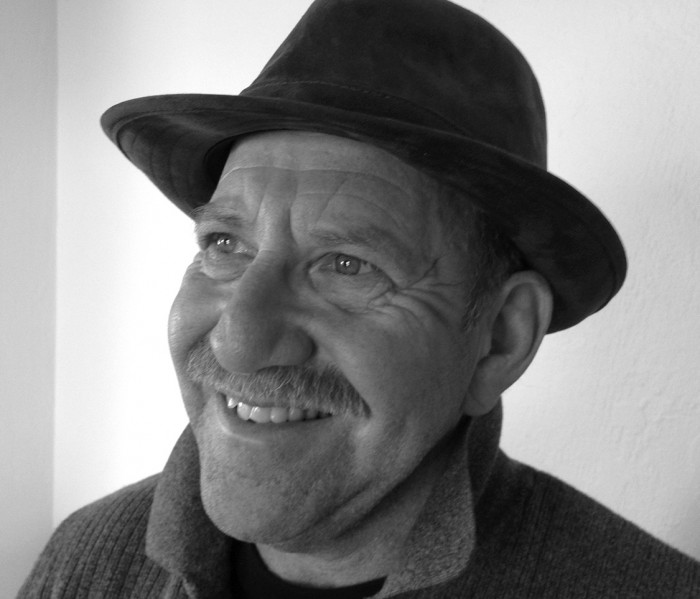My Grandfather is a Pilot
by Tommy Dean
He only flies on the weekends and since my girlfriend left me, my grandfather and I have been flying around the world. He always calls me on Thursday, and asks me, “Are you ready for your lesson?” to which I usually reply, “Just until I find something better to do.” He laughs and I can usually hear the tinkling sound of ice against his glass as he stirs another Bloody Mary. Chelsea didn’t break up with me to go out with a football player, because I used to be that guy. No, she broke up with me to start dating the trombone player. A senior, with a promising career and a scholarship to Notre Dame. Whenever I say Chelsea’s name around my grandfather he takes a long drink of his Bloody Mary and says, “Women,” as if that’s all there is to say about the subject. Both of his wives died, he reminds me, so he’s never felt that kind of heartache. Then he smacks his lips and winks. The pictures, both black and white and color in dusty frames tell me otherwise. I spot them all over the small house: the back of the toilet, the end table next to the recliner reserved for guests, and several next to the computer.
Saturday night, I pull into my grandfather’s driveway. My parents’ only let me drive in a forty mile radius and I have to call or text them when I get to my destination. I’m here, I type, close the app, and then open it back up to add a smiley face. I don’t feel all that happy, but it’s part of the illusion I’ve quietly agreed to continue with my family. I could sit here and listen to the engine settle and cool, but my grandfather gets anxious when cars pull in and no one gets out in like the first five minutes. Once, I sat there fighting with Chelsea on the phone and he came out with a pistol in his hand. When he confirmed it was me, he put it in the waistband of his jeans and waited for me to get out of the car.
“Jesus, Gramps.”
“I was just confirming it was you,” he said, a wrinkled smile breaking across his face.
“What if it wasn’t me?”
“Depends on who it was.”
There was more to his life, moments in his youth he never talked about, though I never asked either. Over the years, I’d heard mention, from the distracted and broken off conversations of my parents, of pool halls and bars. My father, an accountant, who had no sense of adventure, even in movies, shook his head when I told him about the gun. “That man’s always been a fighter. You get a chance, Joel, take a look at his knuckles.” “Oh, and don’t tell your mother.”
It feels like there is a lot we’re not telling my mother right now. My father thinks it’ll be easier if she finds out later. “When the dirt settles?” I ask more and more. All he can do is nod and grip my shoulder.
I walk up the sidewalk, concentrating on each step, willing my feet to do as they’re told, marveling at the condition of the concrete. The house was built in the late 40s, but you wouldn’t know it from all of the maintenance my grandfather does every year. The porch light is on, and though it’s a summer night the wind through the breezeway is cold and if I had any hair left, I’d surely have been wiping it out of my face. They say it won’t grow back this time.
I knock and wait for him to answer. From inside, the floorboards creak under his weight and there is the rustle of locks being undone. Light spills from the kitchen around the broad shape of my grandfather as he peers through the screen in the storm door.
“I guess the raccoons have learned how to knock.”
“You’d probably treat them better than your grandkids,” I say.
“Hell, it’d be a lot easier. Throw them a few scraps and they’d be on their way. I suppose you want to come in?”
The house is small; a three bedroom with less than twelve hundred square feet. How my father lived here with three other siblings I’ll never know. Except somehow they all survived the closeness that small houses bring. The kind of closeness that develops into fights and the sharing of colds and accusations, the kind of hurts that bond a family together though they never tend to see each other except for the holidays.
The linoleum in the kitchen has yellowed and is peeling underneath the table, which in a larger house would have fit nicely in a dining room. Here it sags underneath the weight of mail and old Coca-Cola bottles that my grandfather collects. When he’s not flying the plane, he sits at the table and rubs away the dust and grime that comes from years of neglect. I often wonder if we all couldn’t use a gentle twist or flap of a rag, something to shine us up before we go out into the world. Though I’m sure some of us wouldn’t prefer it. Our bodies chipped and stained, the ugliness of light reflected through glass, vulnerable to another crack when we’ve been mishandled or thrown against the pavement.
My grandpa leads us through the kitchen into a short open space offset between the kitchen and the living room. He walks slower than normal, his hands, usually in his pockets, are out at his sides poised to catch himself should he suddenly lose his balance. His hair too, seems to have thinned since I’ve last seen him. He falls more than sits in the desk chair.
“Getting old isn’t for sissies,” he says.
I stand there looking down at him. His hands gripping the armrests as though he’s afraid he’ll fall right through the seat.
“What the hell are you looking at?” he asks, his voice weak at first, but filled with piss and vinegar at the end. A phrase he taught me when I was four, at a Fourth of July parade. I remember the look of horror on my mom’s face while I ran around in circles, shouting “piss and vinegar, piss and vinegar.”
“You need a hat. A pilot’s with the wings stitched into the middle.”
“What for?”
“You know, to make it official.”
“Nah, that’d make it too real. Then I’d feel bad flying with one of these.” He picked up the sweating highball (another word he taught me) and took a swallow of the red juice. The vodka concealed by the color, but no one that knew my grandfather was ever fooled.
I take a seat in the creaky, wooden dining room chair that sits to the left of the office chair. When we first started our routine, I carry the chair back at the end of each visit, but now I’m too weak to protest, so it sits there every weekday night waiting for my return. I’m sure it bothers him to snake around the damn thing every night when goes to check his email, but he’s never said a word.
My grandpa pecks at the keyboard and images of his first wife vanish from the screen. Other pictures take her place, and I’m surprised by the chronology: second wife (my grandmother crocheting prior to the MS), their children (my dad with long hair and buck teeth), and then shots of my two sisters and I aging from infants to teenagers and all of the awkwardness in between. His life flashes onto and off the screen in seconds. The computer fan whirs and a life that’s just about out of gas passes away back into a binary plasma until they’re called back to the screen again.
Against the wall, next to the computer is an old roll-top desk covered in picture frames. I had attributed these remnants of the past to my grandmother’s sense of decorating, but she’s been gone for several years and still the frames remain. They make the house feel smaller as if it’s full of life, while my parents home seems devoid of pictures as if they would take up too much space. I’ve overheard my mother comment to my father that she likes clean, sharp lines.
I grab one of the frames and wipe my finger around the corners. When I look at my finger I expect to see a smudge of dust, but there’s nothing there but the whorls of my fingerprint. It reminds me of a time when I was younger when I was active in Cub Scouts and our group leader took us down to the local police station to have all of us fingerprinted. It satisfied the requirements of one of the badges, though I no longer had the stoll they were collected on. The cop was fat with smelly breath that leaked out of a mouth covered by the wisps of a half-grown mustache. His face was so round, his hair buzzed tight to his scalp, it could have used the extra hair to give his features some kind of definition. His head looked like a watermelon perched atop human shoulders. I wondered if he got punched a lot. A face like that was just asking to be pummeled. He took my wrist roughly and pushed my thumb into the ink pad, rolling it right and left as if I didn’t have any motor control, as if I were a doll, a thing he could fling around as he chose. He made a big deal about telling us, six boys under the age of thirteen, that the fingerprints would help the police find us if we were ever taken. Alive? I wanted to ask, but didn’t because I didn’t want him to remember me. I kept thinking about the record they now had of my prints, how they’d now be a part of the national database, where if I should ever commit a crime they’d be able to link me to the crime scene. Now I didn’t plan on committing any crimes not then, and not now, but I didn’t like the thought of them having everything they needed. And I’d given it to them willingly.
My grandpa sighs as he repositions himself in the leather office chair. He tabs at the keyboard and the flight simulator comes onto the screen. The rattle of a large engine blares from the speakers that sit next to the bulky rear-projection monitor.
“I know it’s your turn to pick the destination, but I’d like to have another turn. You don’t mind, do you?” he asks, his eyebrows raised, as if this is an honest question, when we both know that I don’t care where we go. Even when I do pick a place, it’s only to make him happy and through his gentle suggestions.
“Like Hell,” I say, because that’s how we talk to each other. A couple of old men, who should have seen better days, but they never really materialized.
“”Good, because there’s a flight I’ve always wanted to pilot and I think today is the day.”
“Just tell me that we’re not going to Europe again, because that took forever. And you were definitely over your limit that night.
“That’s why I’ve got my copilot.” he squeezes my neck, but the pressure seems weaker than usual.
“My captain, my captain, where are we headed?”
“Boston to California, my good lad.”
“And our mood tonight? Cherished memory or shameful regret?”
He takes a long drink of his Bloody Mary–his father’s drink. “Oh a little of both, I’m afraid. It’s the measure of life.”
“Just as long as we can land the thing this time. That airport in Fiji was unreal. Who plops an airport down between the ocean and a mountain? I can’t believe people really fly there.”
“I don’t think we’ll have to worry about the landing this time.”
“Fine. Then move over old man and pass me that keyboard. I’ll take her up to cruising altitude.”
He rocked his chair to the right and slid the keyboard closer toward my waiting hands. I moved my fingers expectantly like a Jazz pianist. Tap, Tap. The keys responded to my poking and the plane on the screen rattled to life. The pilot avatar, with only his hands showing, since the camera in the game was slotted for first person point of view, pushed the speed lever forward and the camera switched to the outside of the plane where it taxied faster down the runway. The number on the tail of the plane was 73. I tapped a key and the camera focused back on the cockpit. The simulator was actually pretty easy to play in that it only took a few taps of the keys to get the plane up into the air and cruising along. Like most kids my age, I enjoyed more complex and violent games, but the one time that I tried one of these games with my grandfather he almost broke my controller by throwing it at the ground. He had stomped out of the room and refused to return until I had got the goddamn thing off the screen.
I pivot the camera from cockpit, to the engines, to the tail, and then to the interior where usually there were pixelated people stretched out across the seats. In this flight, there were two lone avatars sitting in the front close to the cockpit door. The graphics aren’t up-to-date, so the two figures look too much like cartoons compared to the newer games that were made for the latest gaming consoles. I flip through row after row until I get to the front and I notice that the figures match our likenesses. A few months back, as a joke, we had made ourselves using the limited character building options. I looked more like a kindergartener than a sophomore in high school and my Grandfather had really large biceps, which he assured me he used to have in his own youth. I didn’t remember ever actually adding them to the passenger list before tonight though.
“Where’s the rest of the passengers?”
“Check the Flight List, Co-pilot.”
A few clicks of the mouse takes me away from the interior of the plane and to a screen with a list of the passengers. My grandfather and I are the only names on the list.
“Where are all the other fake people? Donny, the accountant with the drinking problem, and Celeste, who is thinking about running away from her family?” Sometimes we make up fake backstories for the other avatar passengers. It’s our way of living different lives I guess, though sometimes I wonder if I’ve lived enough of my own to know that someone’s else’s life might be better. I’m just starting, I want to tell God or the universe, whoever is control.
“We’re flying solo, bud. I didn’t want anyone else on this flight.”
Why, I almost ask him, but there’s something in his voice that stops me from asking. Even when I was a child, it wasn’t a question he ever liked to answer. Ask your mom, he’d tell me over and over.
“I guess we’d better get this over with,” he says, as if he’s suddenly exhausted. “Would you get me another one of these while I get us back on track?” He hands me his glass, the smell of tomato and vodka drifts between us and I can’t tell if it’s coming only from the cup or if he’s getting closer to that moment where the smell of his body is more vodka and tomato than his normal smell of cigarettes and western aftershave.
In the kitchen, I rinse out the red residue from the bottom of the glass. He hides the vodka in the cabinet next to the sink. He told me once that a man shouldn’t be ashamed of the things in his home, but he didn’t need to invite gossip either, so the vodka stayed hidden and guests were offered Pepsi. The bottle is large, with a round bottom and a long neck. There isn’t much in there, maybe enough for two or three drinks so I pour about half into the glass. I don’t have much experience in this, so I don’t know if it would be considered the normal amount or not, but I’ll have to warn him that’s he’s almost out. I grab the tomato juice from the ancient and yellowing fridge. It’s so old that the seal in the door doesn’t work all that well and the door opens easier than a swinging gate. As I pour the juice, I try to imagine again what it tastes like and why it’s so appealing to my grandfather. How could he stand to drink one or six every night? My mother had outlawed alcohol in our home except for the rare bottle of wine around the holidays. It’s not something my father or her ever talked about with us, but I’d never seen either of them drunk. It wasn’t how they dealt with the minor dramas of their lives. My mother, especially, attacked everything head on and she relied on her ability to be ever present if a problem should arise. Alcohol would have diminished her ability to concentrate on the solution, a solution she might suffer over for weeks.
“Ty, why don’t you make yourself one too,” my Grandfather shouted.
I walked into the next room carrying the glass, my legs already stiffening up from standing long enough to make the drink. I wish I could tell him about the pain, how I know that it might be coming back.
“You sure?” I ask, handing him the cup. “I don’t want anyone to get in trouble.”
“Go, go.” He shoos me away with his free hand. “We won’t tell your mother. Besides what good is flying first class if you can’t enjoy the free drinks?” He smiles over the brim of his glass, takes a long drink, and motions for me to hurry up.
Though it feels like I’m dragging my left leg, I hurry into the kitchen. I open the cabinet with the cups and I hesitate. At home, we only use plastic cups, but that seems so childish when I’m going to have my first drink, so I grab a glass like my grandfather’s and I go to work making another drink.
My mother didn’t like these visits. Not because of my grandfather’s language or references about the seedier things he had done in his life, though these things were usually included in her arguments with my father; arguments that I wasn’t supposed to hear, but inevitably heard, because my mother’s vehemence didn’t allow her to whisper. No her real problem with the way that I spent my Saturday nights was that she thought that I was wasting my time. Time that had become even more precious as I got older and the chances of remission twindled. She’d casually mention dances or movies, things I could do with my friends. Normal things, she never said, but her eyes often pleaded in those few minutes we spent passing each other in the darkened hallway outside of my bedroom before I went off to bed. My friend options had narrowed through the years as my cancer became normal, boring, and a thing they could avoid without much guilt. It was no longer cool to hang out with the kid with cancer. And I too had realized that it was no longer worth trying to fit in. I never would. So I helped my grandfather fly his simulation missions and waited. This, I wanted to tell my mother, is when I owned time.
When I sit back down I notice two things: the first is that my grandfather’s drink is about gone already and that there is something wrong with the plane. The plane takes a wide arc and the engine starts to whine with the increase in speed. We’re traveling at 500 miles per hour and the pixelated clouds look like marching marshmallows as they glide over the windshield. A bell dings warning us that we’ve drifted well off of our original course. Another warning sounds goes off, reminding us that we may run out of gas or stall at these speeds. My grandfather hits the spacebar twice and the alarms are silenced leaving only the synthetic sound of rushing wind outside the simulated cockpit. We’ve never went off course before, nor have we ever cranked the plane up to these speeds. The game, with its weak graphics and lousy processor hitches and threatens to crash.
“Are you trying to give your fake self a heart-attack?”
“I wish it were that easy, Ty.” He shakes his head and holds up his glass. “Let’s drink, son.”
He gestures at my glass and I hold mine up like his as if we’re about to toast.
“Normally, for a first drink I’d tell you to take it slow, but tonight’s a little different and we don’t have the time for all of that namby-pamby stuff. We’ll drink together, alright? Don’t stop until I do. Can you do that for me, Ty?”
The tone of his voice–sad, angry, a bit hostile–makes me look him in the eye and I can see why my dad is so scared of him, but also why he loves him so much. I’m surprised that he’s not crying, but finally I nod and put the glass up to my lips. The smell of tomato is strong and the glass is cold against my lips. We tip our glasses and at first it tastes only like soup, but then as the liquid slides down my throat I think of eating hot food, campfires, and the time I had bronchitis. I tip the glass until it feels as though I’m drowning. I catch, from the corner of my eye, my grandfather lowering his glass and finally I take the cup away and suck in air.
“Jesus, How do you drink that stuff?” I wipe my mouth the back of my hand.
“It’s an acquired taste,” he says, laughing. I laugh too and I think of that scene in Beauty and the Beast where Gaston sings about his triumphs. I don’t mention this thought, because it’s another reminder of just how young I must seem to him.
“Grandpa, why are we doing all of this?” I wave my hands and arms around as if I’m a conductor who is fed up with his orchestra, indicating God knows what, because my head feels as though it’s trying to float away from my neck. The edges of my vision have gone a bit sparkly as the liquid settles in my stomach.
“Just watch the screen. A few more minutes and we’ll have our answer.”
“Answer? What? What are we doing?”
Tap, tap at the keys and my grandfather drops the plane several thousand feet. The camera tilts and I know that we’re nosing down toward the ground. The Earth comes into focus and I’m amazed again at how it looks like a patchwork quilt with it’s tidy squares of farmland and suburbs.
“Ty, We don’t have much time.”
“Time for what? This is getting a bit creepy Grandpa. Even for you.” Nervous, I take another sip of the drink.
“I wanted to see what it felt like. You know, to make those calls.”
“What calls? Look, the plane is going to crash,” I said, pointing at the screen. I killed thousands of soldiers in my own games, but I didn’t want this plane to crash.
I reached for the keyboard and he smacked my hand. It didn’t hurt at first, just stung like I was a child, the one I’d been trying to hide all night.
“What the hell was that for?” I sat back in my chair, a little afraid of where this was all going.
“You remember the movie we watched a couple of weeks ago? The one about Flight 73?”
“9/11? That was over ten years ago. What does that have to do with anything?”
“What doesn’t it have to do with? I’ve got some news. Bad news, actually. And I wanted to tell you when we were watching that movie, but I saw you crying…” I start to protest, and he waves me down. “I’m not saying there’s anything wrong with it, but I thought we had heard enough about death that night, so I’ve been trying to figure how to tell you ever since.”
The bells and alarms are back, forcing their way out of the speakers. I glance at the screen and the plane looks as though it’s been flung like an arrow toward the earth. A field comes closer, the individual details coming into focus. The field is surrounded by several small groups of trees, their branches fanned out like a huddle of school children waiting for the bus in winter.
“We’ve got to pretend here like I’m on that flight. I know I’m headed for a crash that you don’t walk away from. They’ve got these phones on the plane, you see, that can call anywhere in the world from the air. I’m up there with those other people, and I’m crying, and praying and cussing and I’m only thinking about you, Ty. You’ve been dealt a shitty hand. Christ. At your age, but I call you, son, because I know that you’ll understand. You might not remember it, but you’ve stared down that coward Death before and I need your strength, because he’s coming for me now. My plane is going down and I thought I was ready, but I’m not so sure now. So I thought I’d see what it was like to die. And I’ve been thinking about it for weeks, and this is the only thing I could think of and I’m sorry you have to come along, but I need a co-pilot for this last flight.”
He looks at me and the anger is gone, replaced by the same emotion I often find in my own eyes when I look in the mirror: fear.
I pull my chair closer and I take his hand. If I ignore the calluses and the gnarled knuckles, the skin is clammy and weightless, his grip loose, as if he’s waiting me for me to lead the way. We brace ourselves for the impact, holding onto each other, knowing full well that neither can really save the other, but in this simulated moment of panic, we take solace in knowing that somebody else is there. It won’t protect our bodies, as the plane hurtles toward the Earth, but for these last seconds, we free-fall into the place where our bodies, finally, cannot harm us.
No one died that day, at least not anybody real. We never flew again. We had, finally, one less mystery. Death, we agreed, could wait.
BIO
 Tommy Dean is the author of a flash fiction chapbook entitled Special Like the People on TV from Redbird Chapbooks. A graduate of the Queens University of Charlotte MFA program, he has been previously published in the Watershed Review, Wilderness House Literary Review, r.kv.r.y, Boston Literary Magazine, Foliate Oak, and Gravel. Find him @TommyDeanWriter on Twitter.
Tommy Dean is the author of a flash fiction chapbook entitled Special Like the People on TV from Redbird Chapbooks. A graduate of the Queens University of Charlotte MFA program, he has been previously published in the Watershed Review, Wilderness House Literary Review, r.kv.r.y, Boston Literary Magazine, Foliate Oak, and Gravel. Find him @TommyDeanWriter on Twitter.



 Jacqueline Bridges works as a guidance counselor to junior high students, where she puts her Masters degree to work, and then some. She is new to flash fiction and reads it daily (even in the counseling office). Her students join her weekly for a writing club, where they impress her with stories about fairies, dragons, and golden retrievers. She has three publications to-date, with 365 Tomorrows, Touch Poetry, The Fable Online, and Short Fiction Break. She’s currently working on a young adult, science fiction novel, mostly void of fairies, dragons, and golden retrievers.
Jacqueline Bridges works as a guidance counselor to junior high students, where she puts her Masters degree to work, and then some. She is new to flash fiction and reads it daily (even in the counseling office). Her students join her weekly for a writing club, where they impress her with stories about fairies, dragons, and golden retrievers. She has three publications to-date, with 365 Tomorrows, Touch Poetry, The Fable Online, and Short Fiction Break. She’s currently working on a young adult, science fiction novel, mostly void of fairies, dragons, and golden retrievers.
 Sara Regezi is a former copywriter, former comic, former musician, and current nurse practitioner in Silver Spring, Maryland. She wants to marry Jess Walter except that she’s already married (and so is he, probably). Her previous work has appeared on girlcomic.net and live onstage with Monalog Cabin. She is thrilled to be published in Writing Disorder.
Sara Regezi is a former copywriter, former comic, former musician, and current nurse practitioner in Silver Spring, Maryland. She wants to marry Jess Walter except that she’s already married (and so is he, probably). Her previous work has appeared on girlcomic.net and live onstage with Monalog Cabin. She is thrilled to be published in Writing Disorder.
 Charles Lowe’s work has been nominated for the Pushcart Prize and has been published or is forthcoming in Prairie Schooner, Fiction International, Guernica, the Pacific Review, Hanging Loose, and elsewhere. His fiction has also been included in the recently published anthology, Friend. Follow. Text. #storiesFromLivingOnline. He lives with his wife and daughter in Zhuhai, China, He is the Programme Director of the Contemporary English Language and Literature programme and the Director of the Cross-Cultural Studies at United International College. He lives with his wife and daughter in Zhuhai, China.
Charles Lowe’s work has been nominated for the Pushcart Prize and has been published or is forthcoming in Prairie Schooner, Fiction International, Guernica, the Pacific Review, Hanging Loose, and elsewhere. His fiction has also been included in the recently published anthology, Friend. Follow. Text. #storiesFromLivingOnline. He lives with his wife and daughter in Zhuhai, China, He is the Programme Director of the Contemporary English Language and Literature programme and the Director of the Cross-Cultural Studies at United International College. He lives with his wife and daughter in Zhuhai, China.
 Pat Hart graduated from University of Pittsburgh with a BA in Creative Writing and lives in Pittsburgh where she writes plays, monologues, short stories, novels and a blog. Hart’s playwriting credits include acceptance, production and performance of her one-act play, Book Wench, in the Strawberry One-Act Festival, Summer 2015, New York, New York. The play was selected for the semi-finals and is under consideration for publication in “The Best of the Strawberry One-Act Festival Anthology.” Additionally, Hart’s 10-minute monologue, Murderous was selected by Carlow University’s Drama department and will be performed during “Practice Monologamy” in September 2015.
Pat Hart graduated from University of Pittsburgh with a BA in Creative Writing and lives in Pittsburgh where she writes plays, monologues, short stories, novels and a blog. Hart’s playwriting credits include acceptance, production and performance of her one-act play, Book Wench, in the Strawberry One-Act Festival, Summer 2015, New York, New York. The play was selected for the semi-finals and is under consideration for publication in “The Best of the Strawberry One-Act Festival Anthology.” Additionally, Hart’s 10-minute monologue, Murderous was selected by Carlow University’s Drama department and will be performed during “Practice Monologamy” in September 2015.
 Franklin Klavon has written a novel, Bubba Grey Action Figure, and a collection of short stories, Lemon Wine. His fiction has appeared in Brain, Child Magazine, at storychord.com, verdadmagazine.org, schlock.co.uk, and aphelion-webzine.com. In a previous life he played lead guitar for Bubba Grey and has produced five alternative rock compact discs. Mr. Klavon is an avid chess player and has a Master’s Degree in Mechanical Engineering from the University of Michigan. For more, visit franklinklavon.com.
Franklin Klavon has written a novel, Bubba Grey Action Figure, and a collection of short stories, Lemon Wine. His fiction has appeared in Brain, Child Magazine, at storychord.com, verdadmagazine.org, schlock.co.uk, and aphelion-webzine.com. In a previous life he played lead guitar for Bubba Grey and has produced five alternative rock compact discs. Mr. Klavon is an avid chess player and has a Master’s Degree in Mechanical Engineering from the University of Michigan. For more, visit franklinklavon.com.
 Ron Yates received his MFA from Queens University of Charlotte, where he worked with many fine writers and teachers and completed a novel entitled BEN STEMPTON’S BOY, set in the rural south of the early 1970’s. Yates has recently completed a short fiction collection, MAKE IT RIGHT AND OTHER STORIES, a work driven by two key components of his aesthetic: a desire to create crisp, character-driven prose and to evoke place in a way that furnishes and textures the fictional dream.
Ron Yates received his MFA from Queens University of Charlotte, where he worked with many fine writers and teachers and completed a novel entitled BEN STEMPTON’S BOY, set in the rural south of the early 1970’s. Yates has recently completed a short fiction collection, MAKE IT RIGHT AND OTHER STORIES, a work driven by two key components of his aesthetic: a desire to create crisp, character-driven prose and to evoke place in a way that furnishes and textures the fictional dream.
 Michael Davis’ short fiction has appeared in Descant, The San Joaquin Review, The Jabberwock Review, The Black Mountain Review, Eclipse, Cottonwood, The Mid-American Review, Full Circle, Hayden’s Ferry Review, The Georgia Review, Storyglossia, The Chicago Quarterly Review, Willow Springs, The Normal School, Arcana, The Superstition Review, The New Ohio Review, The Painted Bride Quarterly, The Atticus Review, Isthmus, the Earlyworks Press Short Story Anthology, Redline, and Small Print Magazine. His collection of stories, Gravity, was published by Carnegie Mellon UP in 2009. He has an MFA in fiction writing from the University of Montana and a PhD in English from Western Michigan University. He lives in Bangkok where he is a lecturer in English at Stamford International University.
Michael Davis’ short fiction has appeared in Descant, The San Joaquin Review, The Jabberwock Review, The Black Mountain Review, Eclipse, Cottonwood, The Mid-American Review, Full Circle, Hayden’s Ferry Review, The Georgia Review, Storyglossia, The Chicago Quarterly Review, Willow Springs, The Normal School, Arcana, The Superstition Review, The New Ohio Review, The Painted Bride Quarterly, The Atticus Review, Isthmus, the Earlyworks Press Short Story Anthology, Redline, and Small Print Magazine. His collection of stories, Gravity, was published by Carnegie Mellon UP in 2009. He has an MFA in fiction writing from the University of Montana and a PhD in English from Western Michigan University. He lives in Bangkok where he is a lecturer in English at Stamford International University.
 Mitchell Krockmalnik Grabois has had over seven hundred of his poems and fictions appear in literary magazines in the U.S. and abroad. He has been nominated for the Pushcart Prize for work published in 2012, 2013 and 2014. His novel, Two-Headed Dog, based on his work as a clinical psychologist in a state hospital, is available for
Mitchell Krockmalnik Grabois has had over seven hundred of his poems and fictions appear in literary magazines in the U.S. and abroad. He has been nominated for the Pushcart Prize for work published in 2012, 2013 and 2014. His novel, Two-Headed Dog, based on his work as a clinical psychologist in a state hospital, is available for 











